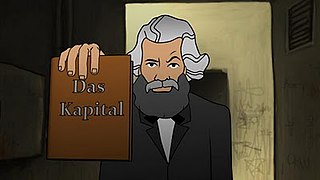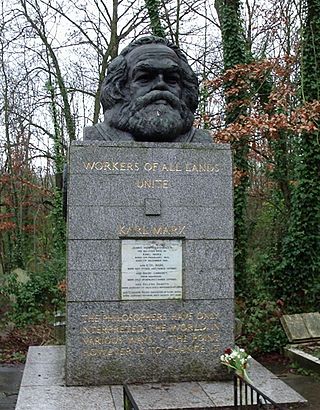
Karl Heinrich Marx was a German philosopher, economist, historian, sociologist, political theorist, journalist, critic of political economy, and socialist revolutionary. His best-known titles are the 1848 pamphlet The Communist Manifesto and the four-volume Das Kapital (1867–1883). Marx's political and philosophical thought had enormous influence on subsequent intellectual, economic, and political history. His name has been used as an adjective, a noun, and a school of social theory.

The Communist Manifesto, originally the Manifesto of the Communist Party, is a political pamphlet written by German philosophers Karl Marx and Friedrich Engels. Commissioned by the Communist League and originally published in London in 1848, the Manifesto remains one of the world's most influential political documents. It presents an analytical approach to class struggle and criticizes capitalism and the capitalist mode of production, without attempting to predict communism's potential future forms.

Friedrich Engels was a German philosopher, critic of political economy, historian, political theorist and revolutionary socialist. He was also a businessman, journalist and political activist, whose father was an owner of large textile factories in Salford and Barmen, Prussia.

A graphic novel is a long-form, fictional work of sequential art. The term graphic novel is often applied broadly, including fiction, non-fiction, and anthologized work, though this practice is highly contested by comic scholars and industry professionals. It is, at least in the United States, typically distinct from the term comic book, which is generally used for comics periodicals and trade paperbacks.

Michael Löwy is a French-Brazilian Marxist sociologist and philosopher. He is emeritus research director in social sciences at the CNRS and lectures at the École des hautes études en sciences sociales. Author of books on Karl Marx, Che Guevara, Liberation Theology, György Lukács, Walter Benjamin, Lucien Goldmann and Franz Kafka, he received the CNRS Silver Medal in 1994.
Ernesto "Che" Guevara, was an Argentine Marxist revolutionary, politician, author, intellectual, physician, military theorist, and guerrilla leader. His life, legacy, and ideas have attracted a great deal of interest from historians, artists, film makers, musicians, and biographers. In reference to the abundance of material, Nobel Prize–winning author Gabriel García Márquez has declared that "it would take a thousand years and a million pages to write Che's biography."
Manga de Dokuha is a series of manga versions of classic literature. Published by East Press, the aim of the series is to introduce average manga readers to important literary works they would otherwise not be aware of or willing to read. The series received press coverage for its publication of often controversial political treatises. East Press published best-selling versions of the communist novel Kanikōsen, Karl Marx's Das Kapital and Adolf Hitler's Mein Kampf. Some of the books were translated and made available in other languages such as English, Portuguese, and Spanish.
Willow Dawson is a Canadian cartoonist and illustrator, whose works include The Big Green Book of the Big Blue Sea with author Helaine Becker, Hyena in Petticoats: The Story of Suffragette Nellie McClung, Lila and Ecco's Do-It-Yourself Comics Club, 100 Mile House, the graphic novel No Girls Allowed, with author Susan Hughes, and Violet Miranda: Girl Pirate, with author Emily Pohl-Weary. Her works have been supported by the Canada Council for the Arts, the Ontario Arts Council and the Toronto Arts Council.
Broken Pencil has called her black and white art style wonderful, bold and full of thought. Dawson also creates painted stand-alone illustrations which she turns into prints and sells on her Society6 site. The original art is created using acrylic ink and paint on recycled cardboard. Her illustrations convey a mood of whimsy and playful-uncanny. Her work typically exhibits flowing linework and favors a 50's color palette.
She is a member of The RAID Studio, The Writers' Union of Canada, Illustration Mundo, and JacketFlap.
Dawson was born in 1975 and grew up in Vancouver, British Columbia. She currently lives in a creaky-old-house-turned-music-school in downtown Toronto.

Non-fiction comics, also known as graphic non-fiction, is non-fiction in the comics medium, embracing a variety of formats from comic strips to trade paperbacks.

Karl Marx and his ideas have been represented in film in genres ranging from documentary to fictional drama, art house and comedy.

For Marx is a 1965 book by the philosopher Louis Althusser, a leading theoretician of the French Communist Party (PCF), in which the author reinterprets the work of the philosopher Karl Marx, proposing an epistemological break between the young, Hegelian Marx, and the old Marx, the author of Das Kapital (1867–1883). The book, first published in France by François Maspero, established Althusser's reputation. The texts presented in For Marx are theoretical interventions in a definite conjuncture, particularly aiming at the definition of the lines to be pursued by the PCF after Stalin's years in the Soviet Union. Althusser's position is of theoretical antihumanism, and is against the teleology of history. Althusser defends that history is a process without subject and with an open end, but that has determinations that can be theorized by the science of history as constructed by Marx in his mature work, Das Kapital. Society is then conceptualized as a complex whole articulated in dominance by the economy where several social practices co-exist with a relative autonomy, introducing the concept overdetemination to characterize the levels of effectivity.

Viken Berberian is a writer and essayist whose works rely on satire and defy easy categorization. Berberian's fiction and essays have appeared in print and online in The New York Times, le Monde Diplomatique, Foreign Affairs, Financial Times, Granta, The Nation, and the New York Review of Books. His novels have been translated to French, Hebrew, Italian, German and Dutch. They are marked by keen wit and a sense of economic and political injustice.

Marxism was introduced by Karl Marx. Most Marxist critics who were writing in what could chronologically be specified as the early period of Marxist literary criticism, subscribed to what has come to be called "vulgar Marxism." In this thinking of the structure of societies, literary texts are one register of the superstructure, which is determined by the economic base of any given society. Therefore, literary texts are a reflection of the economic base rather than "the social institutions from which they originate" for all social institutions, or more precisely human–social relationships, are in the final analysis determined by the economic base.

Das Kapital, also known as Capital: A Critique of Political Economy or sometimes simply Capital, is a foundational theoretical text in materialist philosophy, critique of political economy and politics by Karl Marx. Marx aimed to reveal the economic patterns underpinning the capitalist mode of production in contrast to classical political economists such as Adam Smith, Jean-Baptiste Say, David Ricardo and John Stuart Mill. While Marx did not live to publish the planned second, third and fourth parts, the second and third volumes were completed from his notes and published after his death by his colleague Friedrich Engels; the fourth volume was completed and published after Engels's death by Marxist philosoper Karl Kautsky. Das Kapital is the most cited book published before 1950 in the social sciences.
The proletariat is the social class of wage-earners, those members of a society whose only possession of significant economic value is their labour power. A member of such a class is a proletarian. Marxist philosophy considers the proletariat to be exploited under capitalism, forced to accept meager wages in return for operating the means of production, which belong to the class of business owners, the bourgeoisie.

The Grundrisse der Kritik der Politischen Ökonomie is an unfinished manuscript by the German philosopher Karl Marx. The series of seven notebooks was rough-drafted by Marx, chiefly for purposes of self-clarification, during the winter of 1857–8. Left aside by Marx in 1858, it remained unpublished until 1939.
"World Forum/Communist Quiz" is a Monty Python sketch, which first aired in the 12th episode of the second season of Monty Python's Flying Circus on 15 December 1970. It featured four icons of Communist thought, namely Karl Marx, Vladimir Lenin, Ché Guevara and Mao Zedong being asked quiz questions.

The following outline is provided as an overview of and topical guide to Marxism:

The Tomb of Karl Marx stands in the Eastern cemetery of Highgate Cemetery, North London, England. It commemorates the burial sites of Marx, of his wife, Jenny von Westphalen, and other members of his family. Originally buried in a different part of the Eastern cemetery, the bodies were disinterred and reburied at their present location in 1954. The tomb was designed by Laurence Bradshaw and was unveiled in 1956, in a ceremony led by Harry Pollitt, the General Secretary of the Communist Party of Great Britain, which funded the memorial.
Samuel Moore was an English translator, lawyer and colonial administrator. He is best known for the first English translation of Das Kapital and the only authorised translation of The Communist Manifesto which was commissioned, thoroughly verified and supplied with footnotes by Friedrich Engels. Moore also wrote a summary of a notebook by Marx which was published as Chapter III of the third volume of Das Kapital.














